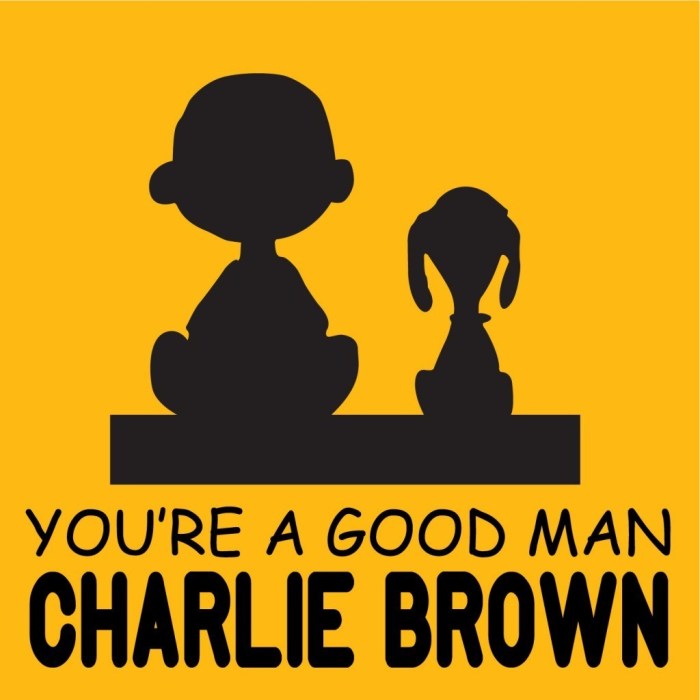You’re a good man charlie brown lucy monologue – In “You’re a Good Man, Charlie Brown,” Lucy’s iconic monologue stands as a testament to her manipulative and condescending nature, shaping her interactions with Charlie Brown in ways that highlight the complexities of their relationship and challenge societal norms.
Through a detailed analysis of Lucy’s personality traits, Charlie Brown’s insecurities, and the power dynamics at play, this monologue offers insights into the psychological and social dynamics that govern their interactions.
Lucy’s Characterization

Lucy van Pelt is a complex and multifaceted character in “You’re a Good Man, Charlie Brown.” She is known for her manipulative and condescending nature, which shapes her interactions with Charlie Brown.
Lucy is often seen as the antagonist of the story, as she frequently takes advantage of Charlie Brown’s insecurities and self-doubt. She is also known for her sarcastic wit and sharp tongue, which she uses to put down others.
However, Lucy is not simply a one-dimensional villain. She also has moments of vulnerability and insecurity, which humanize her character.
Charlie Brown’s Characterization
Charlie Brown is the protagonist of “You’re a Good Man, Charlie Brown.” He is a kind and compassionate boy, but he is also insecure and self-doubtful.
Charlie Brown’s insecurities stem from his lack of self-esteem. He is constantly comparing himself to others and coming up short. This makes him easy prey for Lucy’s manipulations.
Despite his insecurities, Charlie Brown is a resilient character. He never gives up on his dreams, even when things are tough.
The Power Dynamics, You’re a good man charlie brown lucy monologue
The power dynamics between Lucy and Charlie Brown are complex and uneven. Lucy has the upper hand in their relationship, as she is more confident and assertive than Charlie Brown.
Lucy’s manipulation and Charlie Brown’s passivity create an unbalanced relationship. Lucy is able to control Charlie Brown and get him to do what she wants.
The Use of Language
Lucy’s use of language is a key aspect of her character. She is known for her sarcasm, condescension, and manipulation tactics.
Lucy’s sarcasm is often used to put down others. She is also known for using condescending language, which makes others feel inferior.
Lucy’s manipulation tactics are often subtle, but they are effective. She is able to get Charlie Brown to do what she wants without him even realizing it.
The Role of Gender
The monologue explores gender roles and stereotypes. Lucy’s behavior challenges traditional gender norms and expectations.
Lucy is a strong and independent female character. She is not afraid to speak her mind and stand up for herself.
Lucy’s behavior challenges the traditional view of women as being passive and submissive.
The Monologue’s Impact
The monologue is a significant moment in the play or film. It reveals the characters’ relationships and sets up the plot.
The monologue also provides insight into the characters’ personalities. It shows us that Lucy is a manipulative and condescending character, while Charlie Brown is a kind and compassionate boy.
Cultural and Historical Context
The monologue reflects the social and cultural attitudes of the time. It was written in the 1960s, a time of great social change.
The monologue’s exploration of gender roles and stereotypes was particularly relevant to the time. The 1960s was a time of growing feminism, and the monologue’s depiction of a strong and independent female character was groundbreaking.
Key Questions Answered: You’re A Good Man Charlie Brown Lucy Monologue
What is the significance of Lucy’s use of language in the monologue?
Lucy’s sarcasm, condescension, and manipulation tactics contribute to the overall tone of the scene, highlighting her power over Charlie Brown and her disregard for his feelings.
How does Charlie Brown’s lack of self-esteem contribute to his relationship with Lucy?
Charlie Brown’s insecurities and self-doubt make him vulnerable to Lucy’s manipulation, as he constantly seeks her approval and validation.
In what ways does the monologue challenge traditional gender roles?
Lucy’s assertive and manipulative behavior challenges traditional gender norms, as she defies the expectations of a “typical” female character.
